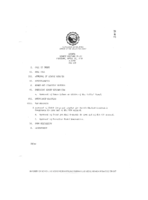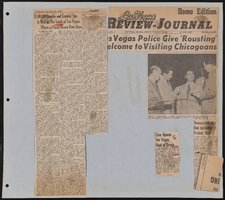Search the Special Collections and Archives Portal
Search Results
Maria LaCavera Papers
Identifier
Abstract
The Maria LaCavera Papers (1947-2017) contain the papers of professional dancer Maria LaCavera. The collection documents the career of LaCavera dancing in Las Vegas, Nevada at the Flamingo Hotel in 1947, and the Last Frontier Hotel in 1949 as one of the Ramona Girls dancing in the Danny O'Neil Varieties Act. Materials include photographs of LaCavera and other Ramona Girls, newspaper clippings, correspondence, LaCavera's American Guild of Variety Artists (AGVA) employment contracts, Fabulous Las Vegas magazines, and hotel receipts. Other items of note include photographs of the 1949 Helldorado parade, a Frontier Hotel Ramona Room menu, and Frontier Hotel ephemera. There is also a copy of a self-published biography of LaCavera, written by her daughter-in-law Kristin Meyer entitled From Bon-Air to the Last Frontier. The collection also contains the digital images used to illustrate the book.
Archival Collection
Stocker Family Papers
Identifier
Abstract
The Stocker Family Papers (1860-1982) document the family’s personal, political, and business interests including Mayme Stocker’s 1931 Nevada gaming license and Harold Stocker’s involvement in the Nevada Republican party. The collection contains family correspondence, political documents and planning materials, and business records related to the family’s gaming and real estate interests.
Archival Collection
Sister Klaryta Antoszewska Photograph Collection
Identifier
Abstract
The Sister Klaryta Antoszewska Photograph Collection (1977-1991) consists of photographic slides that depict various Nevada, United States, and international nuclear test protests. The collection includes images of Sister Klaryta Antoszewska and Sister Rosemary Lynch, as well as images of the Lenten Desert Experience and numerous protests at the Nevada Test Site. Also included are images of nuclear testing, soldiers, and anti-nuclear testing promotional materials.
Archival Collection
Gay and Lesbian Community Center of Southern Nevada Photograph Collection
Identifier
Abstract
The Gay and Lesbian Community Center of Southern Nevada Photograph Collection contains mainly candid photographs of events and individuals affiliated with the Las Vegas-based Gay and Lesbian Community Center of Southern Nevada (GLCCSN) dating from 1993 to 2000. Photographs depict events honoring prominent members of the gay, lesbian, bisexual, transgender, and queer community; meetings at GLCCSN; and candidate nights for members of the community running for public office. The collection also includes a number of photographs of the Freedom to Marry celebration at the GLCCSN and the Gay Pride Las Vegas festival from 1998 to 1999.
Archival Collection
University of Nevada, Las Vegas Office of the President Records
Identifier
Abstract
The University of Nevada, Las Vegas (UNLV) Office of the President Records is comprised of documents used in daily matters of the Office of the President from approximately 1950 to 2007. The records in the collection document the expansion of the UNLV campus, and the academic and athletics programs offered by the university.
Archival Collection
Michael McKensie Pratt Professional Papers
Identifier
Abstract
The Michael McKensie Pratt Professional Papers (approximately 1950-2021) contain costume designs, musical selections, and synopsis for shows that Pratt worked on in Las Vegas, Nevada including 90 Degrees & Rising, Les Folies Chic, and Jubilee!. The collection also contains souvenir show programs for cabaret shows performed in Paris, France and Las Vegas, Nevada, including
Archival Collection
Ferron and Bracken Photograph Collection
Identifier
Abstract
The Ferron and Bracken Photograph Collection depicts Southern and Central Nevada and other western states from 1890 to 1961. The photographs primarily depict the development and growth of early Las Vegas, Nevada; mines and mining operations in Southern and Central Nevada; towns and mines in Nevada; and the Hoover (Boulder) Dam and the Colorado River.
Archival Collection
Stella Champo Iaconis oral history interviews
Identifier
Abstract
Oral history interview with Stella Champo Iaconis conducted by Kay Long on May 14, 1997, May 21, 1997, May 26, 1997, and September 22, 1997 for the Women's Research Institute of Nevada (WRIN) Las Vegas Women Oral History Project. Iaconis opens her interviews discussing her difficult upbringing and life on a ranch in Las Vegas, Nevada with her dad in the 1910s and 1920s. Iaconis then describes her experiences as a waitress in Las Vegas. As the interviews continue, Iaconis discusses Block 16 and sex work, the Helldorado Days, and life in 1930s Las Vegas. Iaconis ends the interview talking about her father and his career as a miner; her many husbands; and her personal history in Las Vegas.
Archival Collection

Meeting minutes for Consolidated Student Senate University of Nevada, Las Vegas, April 27, 1989
Date
Archival Collection
Description
Text

